 |
Roy and Mary Pearson at their home in Holdrege. The Pearsons recently donated $200,000 to be used by UNMC researcher Iqbal Ahmad, Ph.D., for his research into vision loss. |
Then she learned she could do something about it.
A federal law known as the Pension Protection Act was passed in August and allows people ages 70 ½ and older to make tax-free donations of up to $100,000 out of their retirement accounts to charity.
“We realized, thanks to the new law, we could indeed do something to fight this disease,” Mrs. Pearson said. “It was great to know we don’t just have to sit back and watch helplessly.”
Roy Pearson has been a successful businessman in his hometown of Holdrege, a central Nebraska community with a population of about 6,000. He has several friends in Holdrege who, like himself, suffer from macular degeneration.
Because of his wife’s charitable gift, he began thinking about the blessings life had given him and the struggle he and many of his friends now face to keep their eyesight. Then he decided to join Mary with his own philanthropic gift.
Together, the Pearsons donated $200,000 to the University of Nebraska Foundation, designating it to UNMC researcher, Iqbal Ahmad, Ph.D., for his research in fighting vision loss. Dr. Ahmad is a professor in the department of opthalmology and visual sciences at UNMC.
“I’ve become very well acquainted with UNMC over the years as a member of the Board of Counselors and in other aspects,” Mr. Pearson said. “It’s an institution I respect. And with scientists on staff such as Dr. Ahmad, I believe UNMC is a place where real progress can be made in the fight against macular degeneration and other vision problems.”
Mrs. Pearson agreed. “Dr. Ahmad is doing work that could restore sight for many people. It is exciting to support research that could have such far-reaching effects.”
Macular degeneration is a condition that causes deterioration of the macula, which is located in the human retina and allows a person to see straight ahead. The result is the loss of what is called “central vision” and the ability to recognize faces, read and drive.
There are two common forms of the disease — wet macular degeneration and dry macular degeneration.
Wet macular degeneration — considered the more serious of the two types — occurs when blood vessels grow under the macula. The new blood vessels may be fragile, which makes it easy for them to break and leak blood and fluid that damage the macula.
Dry macular degeneration, which Mr. Pearson has, is more common. It involves deposits — called drusen — forming under the retina. This leads to macular damage. Dry macular degeneration can progress and become wet macular degeneration.
Dr. Ahmad, whose research findings were recently published in the leading science journal Developmental Biology, has found that adult stem cells from rat retinas may hold the key to restoring sight in those with macular degeneration and other diseases.
 |
The Pearsons tour the lab of UNMC researcher Iqbal Ahmad, Ph.D., to learn more about his research into vision loss. The Pearsons hope their recent donation inspires others to support research that offers hope to individuals with macular degeneration and other vision problems. |
The Pearsons’ gift was an impressive and important act of generosity and comes at a critical time in the research, Dr. Ahmad said.
“The gift will be used to help us further our research in hopes of bringing relief to people who suffer from these vision problems,” he said. “The Pearsons’ generosity bolsters our excitement and efforts during a time when we already have gained important momentum in our work.”
The Pearsons’ gift will be used to hire one or two research fellows and help support other areas of Dr. Ahmad’s research.
The couple recently toured Dr. Ahmad’s laboratory to see first-hand the research they believe may offer hope for people who suffer from macular degeneration and other sight problems.
The Pearsons hope their generosity will inspire others to support research. The passage of the Pension Protection Act should make donating money for medical research more attractive, Mrs. Pearson said.
In an effort to kick start such generosity, the Pearsons have issued a challenge to others to match or exceed their gift to UNMC.
“There are researchers, such as Dr. Ahmad, who are doing a lot of good things in the world today,” Mrs. Pearson said. “Many of them need support along the way. We’re glad to help and we hope others will, too. With this new law, it gives some of us a say in where our money is spent. We’re glad we got to put our money toward something we feel strongly about.”
Individuals who have a desire to support UNMC’s research in macular degeneration and other diseases can call Amy Volk, vice president of development at the University of Nebraska Foundation in Omaha at 402-502-0300.